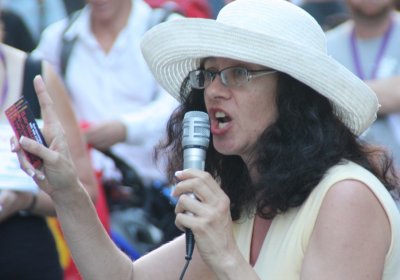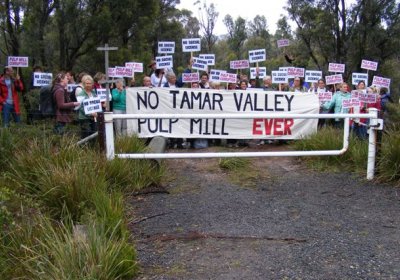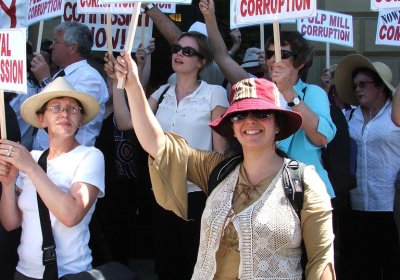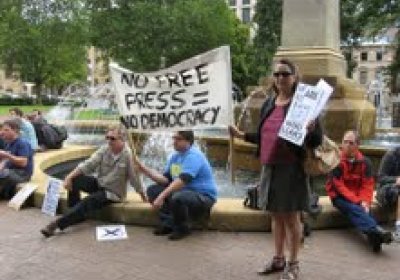In a new twist to Tasmania’s forest industry crisis, two wealthy environmentalists, Graeme Woods and Jan Cameron, have bought the Triabunna woodchip mill from notorious woodchipping company Gunns Ltd.
Gunns had almost stitched up a deal with a pro-logging company called Fibre Plus (owned by Aprin) but this fell through due to problems obtaining finance.
Susan Austin
It’s been a fascinating few weeks in Tasmanian politics.
On June 16, the Labor-Greens government handed down a shocking budget that cut funding to public health, education, police and other services.
Thousands of public service workers gathered on parliament lawns that day to condemn the plan, saying that services were already struggling to meet demand.
The education cuts included a plan to close 20 schools. Education minister and Greens leader Nick McKim started a process of “consultation” with affected school communities around the state.
The deal to restructure the collapsing timber industry in Tasmania is struggling to make headway. Logging continues in old-growth forests at the same time as sawmills and woodchip mills close and more workers lose their jobs.
Anti-logging protests are being held weekly outside the premier’s office in Hobart, and the talks between environment and industry groups continue despite a key player pulling out in frustration.
The Wilderness Society (TWS) suspended its involvement in the Tasmanian Forest Agreement on May 18, citing a failure of leadership from state and federal governments.
Releasing the Mid Year Financial Report in February, Tasmanian Premier Lara Giddings said savings required over the next three years would be the equivalent of 2300 jobs. She said she couldn’t rule out forced redundancies in the public service or cuts to frontline services.
On May 26, Giddings released a statement to parliament that said: “We have now lost a total of around $1.5 billion in expected GST revenue and state taxes.”
Activists in Hobart have condemned the federal government’s plan to imprison 400 men in a new refugee detention centre in Pontville, Tasmania.
Instead, the activists said, the government should use community-based processing and settlement alternatives that respect human rights.
The activists said they were pleased to hear there are plans to house women and children in the community, but said the government should also treat the 400 men who will be imprisoned at Pontville in the same way.
Environment Tasmania (ET), the Australian Conservation Foundation (ACF) and The Wilderness Society (TWS) launched television and radio advertisements on March 30 that call for an end to logging in native forests.
The ads feature University of Tasmania biologist Peter McQuillan, who says: “We need government to implement the agreed forest solution”.
More than 100 people attended a March 15 public forum in Hobart Town Hall about Tasmania’s logging moratorium. The forum was organised by The Wilderness Society (TWS) and the Huon Valley Environment Centre.
TWS, the Australian Conservation Foundation and Environment Tasmania signed the forests “Statement of Principles” agreement with the Forest Industries Association of Tasmania, the Construction Forestry Mining Energy Union and Timber Communities Australia on October 14 last year.
The groups have proclaimed the agreement as the beginning of the end of forest conflict in Tasmania.
The six-year campaign against Gunns’ proposed Tamar Valley pulp mill in northern Tasmania is entering a critical stage.
Federal environment minister Tony Burke approved the three outstanding modules of the mill’s environmental management plan on March 10.
However, pulp mill opponents remain staunchly against the project in whatever form and have vowed to organise ongoing protests and blockades to stop it going ahead.
A mass protest has been called on the site for March 20.
Your Skirt’s Too Short — Sex, Power, Choice
By Emily Maguire
2010, The Text Publishing Company
“Does your boyfriend or brother spend a lot of money on skin and hair care products?”
“Do the majority of fathers you know spend most of their time at home washing, cleaning, cooking and taking care of their kids? Do you often hear mothers refer to looking after their own kids as ‘babysitting’?”
“Are you sick of hearing men go on about how hard it is to balance work and parenthood?”
In a move that took most people by surprise, Tasmanian Labor Premier David Bartlett resigned on January 23. Deputy premier Lara Giddings was sworn in the next day as the first female premier of the state.
Giddings will also keep her position as Treasurer.
Bartlett announced his decision with a message on his Facebook page that said: “To all my Facebook friends and contributors. I have decided to step down as premier and leader of the Labor Party.”
He said his reason was that he wanted more time to be a better father to his children.
About 40 people attended a ‘Hands off WikiLeaks’ rally held in Franklin Square, Hobart on January 29.
Speakers from the Greens, the Socialist Alliance, the Secular Party, Young Libertarians and unaligned individuals addressed the rally. They called on the Australian government to support Julian Assange, defend WikiLeaks and support the right to free speech and freedom of information.
Since the March 20 state elections and the installation of a power-sharing government between the Labor Party and the Greens, there have been quite a few notable developments in Tasmanian politics.
Tasmania could be the first state to legalise voluntary euthanasia. The attorney-general and deputy premier Lara Giddings told states parliament on June 22 she would work with Greens leader Nick McKim to prepare a private members’ bill about voluntary euthanasia.
- Previous page
- Page 3
- Next page











